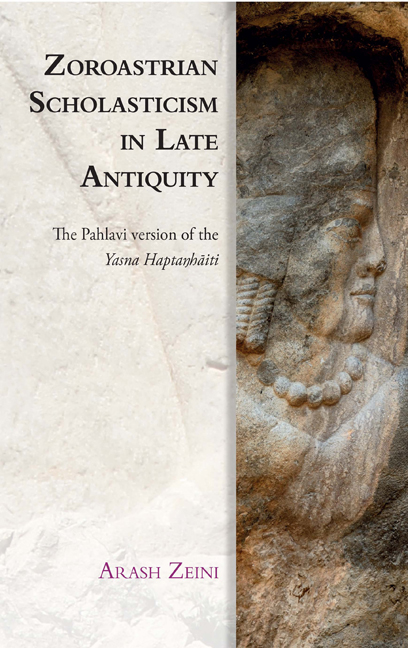Book contents
- Frontmatter
- Contents
- List of Figures
- List of Tables
- Acknowledgements
- Series Editor’s Preface
- Preface
- Conventions
- Abbreviations
- Dedication
- Part I Introduction
- 1 Introduction
- 2 The Zand
- 3 Scholasticism
- 4 Fire in Zoroastrianism
- 5 Precis: Yasn Ī Haft Hād
- Part II Text and translation
- 6 PY 35
- 7 PY 36
- 8 PY 37
- 9 PY 38
- 10 PY 39
- 11 PY 40
- 12 PY 41
- Part III Miscellaneous Observations
- 13 PY
- 14 PY 36
- 15 PY 37
- 16 PY 38
- 17 PY 39
- 18 PY 40
- 19 PY 41
- Part IV Epilogue
- 20 Reflections on the Zand
- Appendices
- Appendix A Transliteration and Apparatus
- Appendix B Y 9.1
- Appendix C Fire in the Older Avesta
- Appendix D Iϑā
- Appendix E MSS Concordance
- Bibliography
- Index of Passages Quoted
5 - Precis: Yasn Ī Haft Hād
Published online by Cambridge University Press: 14 October 2020
- Frontmatter
- Contents
- List of Figures
- List of Tables
- Acknowledgements
- Series Editor’s Preface
- Preface
- Conventions
- Abbreviations
- Dedication
- Part I Introduction
- 1 Introduction
- 2 The Zand
- 3 Scholasticism
- 4 Fire in Zoroastrianism
- 5 Precis: Yasn Ī Haft Hād
- Part II Text and translation
- 6 PY 35
- 7 PY 36
- 8 PY 37
- 9 PY 38
- 10 PY 39
- 11 PY 40
- 12 PY 41
- Part III Miscellaneous Observations
- 13 PY
- 14 PY 36
- 15 PY 37
- 16 PY 38
- 17 PY 39
- 18 PY 40
- 19 PY 41
- Part IV Epilogue
- 20 Reflections on the Zand
- Appendices
- Appendix A Transliteration and Apparatus
- Appendix B Y 9.1
- Appendix C Fire in the Older Avesta
- Appendix D Iϑā
- Appendix E MSS Concordance
- Bibliography
- Index of Passages Quoted
Summary
Scholars recognised shared features and differences between the YH and the Gāϑās early on and have variously attempted to describe them. Wesendonk (1931: 5), for instance, explains the variances by attributing the YH to a priestly school active after Zaraϑuštra's time. He also suggests that abstract ideas present in the older Avesta developed into concrete form in the YH:
Hatte aber Zarathuštra sich einen unpersönlichen und rein geistigen Gottesbegriff vorgestellt, so wird er im siebenteiligen Yasna konkretisiert. (Wesendonk 1931: 31)
Narten (1986: 28–37) explains the differences between the two groups of OAv. texts by way of the different literary genres the texts belong to, while Kellens and Pirart (1988: 36–9), much like Wesendonk, explain the differences by attributing the YH to a ‘l’école haptahâtique’. Be that as it may, as a text in its own right the Pahlavi version of the YH represents a novel interpretation of the Avestan version.
PY 35
The central themes of PY 35, the introductory chapter of the YH, are the triad humat hūxt huwaršt and the dēn, concepts that are closely related to the notion of the reward (ān ī ōy) and the dissemination of the dēn.
humatān hūxtān huwarštān
The formulaic expression humat(ān) hūxt(ān) huwaršt(ān) ‘ good thoughts, good words, good deeds’ is widely attested in the PY as well as the Pahlavi literature. Dk 9.3), the interpretation of the YH, describes the triad's significance:
Dk 9.35.1 120m fragard yasn abar paydāgīh ī humat hūxt ud huwaršt az dēn mehmānīh ī dēn pad humat hūxt ud huwaršt kē humat hūxt ud kē huwaršt xwēšēnēd ā-š ahlawīh ud ān ī ahlawān mizd xwēšēnīd bawēd
The 12th section, the yasn, is on the manifestation of good thoughts, good words and good deeds from the dēn. The presence of the dēn is through good thoughts, good words and good deeds. Whoever makes good thoughts, good words and good deeds his own, he appropriates righteousness and the reward of the righteous ones.
The performance of good thoughts, good words and good deeds is thus the condition for the presence (mehmānīh) of the dēn, and leads to the reward designated for the righteous ones.
- Type
- Chapter
- Information
- Zoroastrian Scholasticism in Late AntiquityThe Pahlavi Version of the Yasna Haptaŋhāiti, pp. 98 - 122Publisher: Edinburgh University PressPrint publication year: 2020



